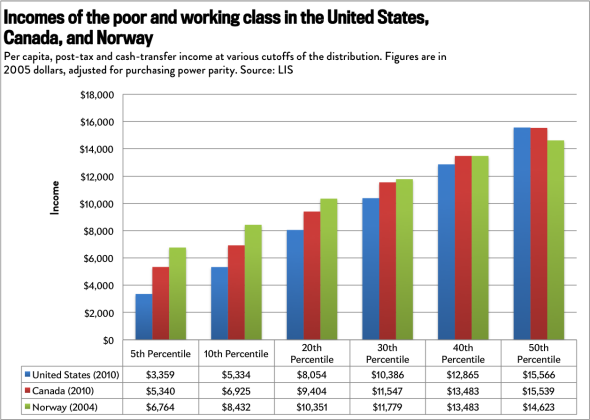jason1637 said:
1. Minimum wage jobs are not meant to be a career. If someone is working a minimum wage job then they did something wrong. Also if we get rid of welfare and social security then corporate taxes can be decreased which will let business to be able to pay their workers more. 2. A higher minimum wage does not mean much because the markets would end up adjusting. Even though Australia has a higher minimum wage their poverty rate is at 13.2% while it's 12.3% here in the US. It's illegal to steal money so there are ways to handle that. b. Investments don't always work out in the end but it's still an option and if you invest wisely the returns can be really good. c. If someone becomes unemployed then they should look for another job. 3. Well depressions don't happen all the time and eventually go away with time. Yeah it will hurt people financially but that's just how it is. 4. If you have a medical condition you should take your meds lol. There is a difference between taking medication and getting addicted. 5. If you invest in communities the standad of living will increase which will allow people to get better jobs so a mother can afford food and an old women can buy insulin. 6. The people that actually need help can get help through the government investing in lower income communities and through charities. They don't need a government handout. |
1. Problem is that millions of jobs only pay minimum wage. Botht hose people and the economy as a whole depend very much on those.
Corporate taxes got decreased very very much over the last decades. Trump just slashed it from 35% to 21%, so in effect almost halved the corporate tax. But by your theory the wages would have been increased in a similar motion. Where are those wage increases, I ask you? Answer: nonexistent, as they are not obliged in any way to pay them more. The brunt of this tax cut goes into executives and shareholder pockets, the rest into investments, buybacks and liquidity reserves. Normal employees get zip out of those tax cuts.
2. a. You have to consider that those poverty lines are arbitrarily set by the state. But extreme poverty is real in the US much more than any other developed country. The reason is the welfare state, or lack thereof in the US. While the rest of the world provides some bottom line which allows people to live, what they get in the US had been described as "too much to die, not enough to live". Just check how low the US bottoms out on this chart:

This is the result of the inadequate US social security and welfare state. And yet republicans want to further cut that down.
b. Investments don't always work out. Yeah, but that's not the problem. The problem is that you need to have some expendable income to be able invest something in the first place.
c. Believe me, they do. But finding a job is not always as easy as you seem to think, especially not if your skillset is too limited or outdated.
3. It took 6 years to get unemployment in the US back to pre-recession levels of 2006. If you're unlucky that means over 5 years of unemployment for you. Of course the recession will go away after a while, but it's effects linger around for much longer than you think.
4. What if you can't afford those medicines? That's what universal healthcare is supposed for, after all. But not in the US, apparently.
About the addiction, you know how the opiate crisis started? With prescription drugs containing opiates as extra strong painkillers. They were supposed to give out the opiates very slowly and not make anyone addicted to them. But those who couldn't swallow the pills crushed them, and only then it got found out that when crushed, the retardent wouldn't work (and wasn't strong enough anyway, so anybody with very strong pains was at risk of getting highly dependent on those medicines). Oh, and both the right for painkillers and the allowance for opiates in painkillers stem from unipartisan republican legislation under Bush junior.
5. Only if their wages raise with it. Otherwise only the price of living will go up for them.
6. Not enough to live from. Also, charity only helps against the symptoms, but not the underlying causes of social injustice, which welfare tackles. http://www.bbc.co.uk/ethics/charity/against_1.shtml
This is also why international aid nowadays doesn't just send money into poverty-strick regions, but instead tackle on their own infrastructure to give a groundwork for further development, and bring food for the hungry in a starvation to ensure it's not getting squandered onto other tasks or pocketed by the local governments.
You also don't seem to understand that it's not just a handout. You could make it like in Luxembourg, where you get unemployment aid, but you have to register at the unemployment office, go there every time they call you and go to every job offer they send you (unless on sickness leave, but then you need to send them the doctor's notice), lest you get either reduced aid or no aid at all for a couple months if you're a repeating offender. This is to make sure you're serious about looking for work and not sitting around, waiting for charity donations to trickle in.
The Nintendo eShop rating Thread: http://gamrconnect.vgchartz.com/thread.php?id=237454 List as Google Doc: https://docs.google.com/spreadsheets/d/1aW2hXQT1TheElVS7z-F3pP-7nbqdrDqWNTxl6JoJWBY/edit?usp=sharing
The Steam/GOG key gifting thread: https://gamrconnect.vgchartz.com/thread/242024/the-steamgog-key-gifting-thread/1/
Free Pc Games thread: https://gamrconnect.vgchartz.com/thread/248138/free-pc-games/1/




















